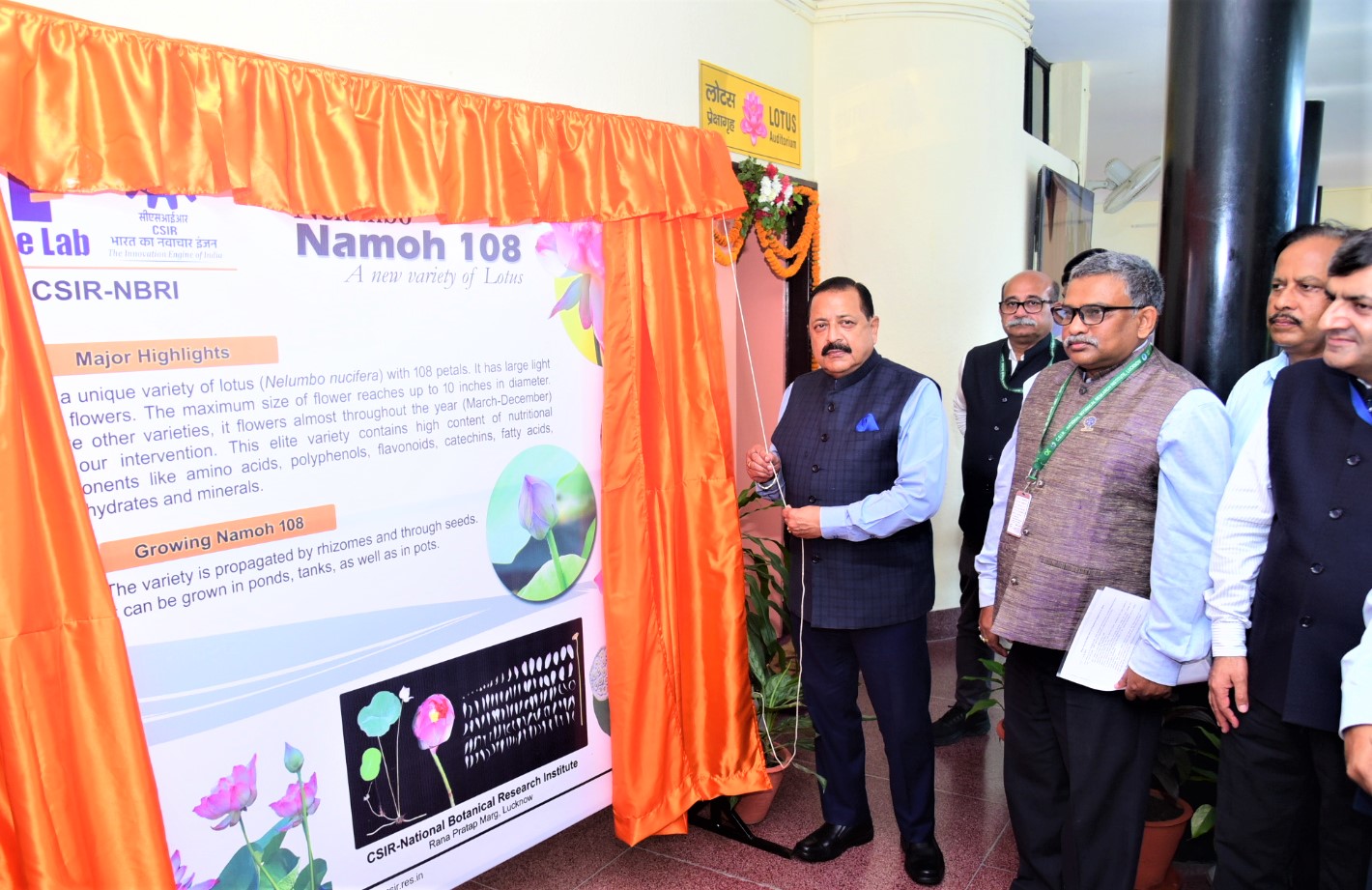
Union Minister of State (Independent Charge) Science and Technology, Dr Jitendra Singh, with Namoh108 lotus in Lucknow today.
Lucknow: A new variety of lotus with 108 petals has been developed by the CSIR-NBRI (National Botanical Research Institute), a premier plant-based, multidisciplinary, state-of-the-art National R&D centre based in Lucknow.
The lotus named ‘NBRI Namoh 108’ was unveiled by Union Minister of State (Independent Charge) Science and Technology, here today.

Dedicating to the nation the Namoh108 lotus variety and its products at NBRI, Lucknow, Dr Singh said, “Considering the religious importance of the ‘lotus flower’ and ‘the digit 108’, this combination gives an important identity to this variety.”
The Namoh 108 lotus variety flowers from March to December and is rich in nutrients. This is the first lotus variety whose genome is completely sequenced for its characteristics.
Dr Singh lauded the NBRI for naming the unique lotus variety as Namoh 108, and added that it was a “grand gift to the relentless zeal and innate beauty of Shri Narendra Modi, coming as it does in the tenth year of his tenure as the Prime Minister”.
The Minister also released apparel made from lotus fibre and the perfume ‘Frotus’, extracted from lotus flowers and developed by the NBRI under the Lotus Research Programme in collaboration with FFDC, Kannauj.
Also launching the Lotus Mission on the occasion, Dr Singh said this project is being undertaken in mission mode like the other priority schemes, – the National Honey and Bee Mission (NHBM), National Bamboo Mission (NBM), National Food Security Mission (NFSM), National Mission on Natural Farming (NMNF), National Mission for Sustainable Agriculture (NMSA), Gokul Mission, Blue Revolution, Mission Shakti – an integrated women empowerment programme and the National Mission on Interdisciplinary Cyber-Physical Systems (NM-ICPS).
In another novel initiative at recycling, Dr Jitendra Singh also released herbal colours for various applications, extracted by NBRI from flower offerings made at temples. These herbal colours can also be used for dying silk and cotton cloths.
The Minister also released the new variety of Aloe vera named ‘NBRI-Nihar’, a clonal selection having approximately 2.5 times high gel yield in comparison to Aloe vera. As per the field observations, ‘NBRI-Nihar’ is found least affected against bacterial and fungal diseases. Two herbal products namely ‘Herbal Cold Drops’ for curing common cough and cold & Herbal Anti Dandruff Hair Oil, made by Marc Laboratories, were also launched by the Minister.
Dr Singh also launched a Database of 500 Raw Drug Repositories of the Institute developed as per Indian Pharmacopoeia Standards and released a book on roses in CSIR-NBRI Garden, comprising the details of elite varieties conserved at the Botanic Garden. On the occasion, an MoU was signed between CSIR-NBRI and Nucleome Informatics, Hyderabad for collaborative research on Cotton. The CSIR-NBRI digital Herbarium, a National Repository of flora specimens of India, was also launched to easily disseminate information among the public and a book on ‘Plant Resources of Uttar Pradesh and a Check List’ and ‘e-flora of Uttar Pradesh’ were also released. The e-flora and book provide a list and information on more than 5,000 plants in Uttar Pradesh.
– global bihari bureau





